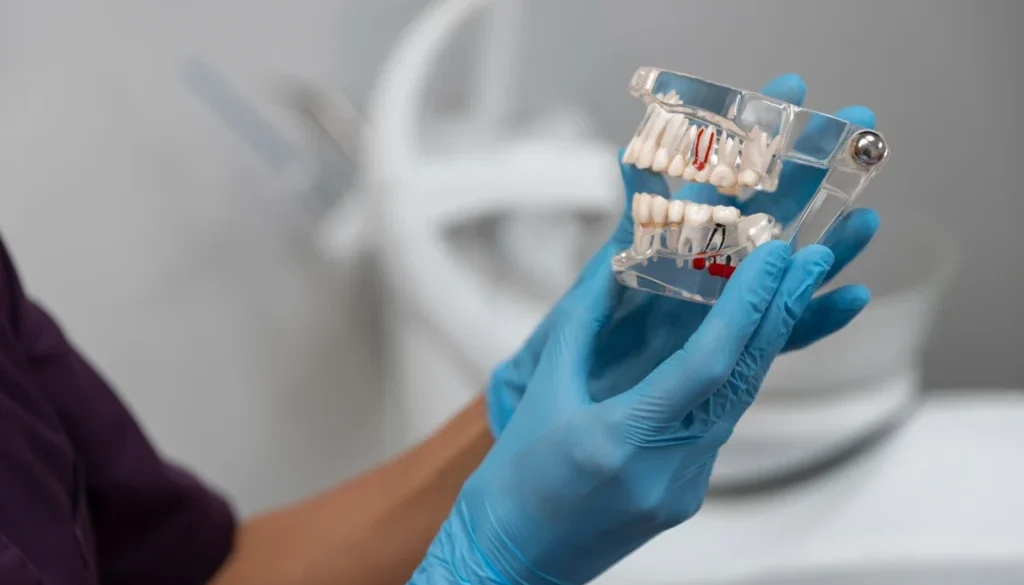Dental Crown in Dubai
Are Dental Crowns Right for You? Factors to Consider
The health of our teeth and gums is essential for our overall vitality and longevity, and maintaining it sometimes requires more than just regular brushing and flossing. A dental crown is one of the most prevalent dental treatments used to protect and strengthen damaged teeth. This in-depth guide will explore what dental crowns for teeth are, explaining their types, procedures, benefits, and aftercare. If you’re looking for a dental treatments such as dental crown in Dubai, our expert dentist at our clinic near you provide top-quality care and solutions
What is a Dental Crown?
A dental crown is a customized cap crafted to cover and renew a tooth that is damaged or decayed, improving its shape, size, strength, and overall appearance. Crowns can be made from various materials, including metal, porcelain, ceramic, and resin. They are used to protect weakened teeth, restore broken teeth, cover and support teeth with large fillings, hold dental bridges in place, and cover dental implants or discolored teeth.
- Metal crowns: Traditionally made from gold or a gold alloy, these crowns offer exceptional durability but may have a less natural appearance.
- Porcelain-fused-to-metal (PFM) crowns: These crowns combine the strength of metal with a layer of porcelain for a more aesthetic look. However, the metal base might show through the porcelain over time.
- All-ceramic or all-porcelain crowns: These crowns provide the most natural-looking results, mimicking the translucency of a natural tooth. However, they might be less durable than metal crowns.
- Zirconia crowns: A relatively new type, they are strong, aesthetically pleasing, and biocompatible, making them suitable for patients with metal allergies.
The choice of material depends on various factors, such as the tooth’s position and desired cosmetic outcomes, durability requirements, and cost. Your dentist will discuss these factors and recommend the optimal choice for your individual needs.
Why Choose Dental Crowns?
Several situations can necessitate a dental crown:
- Severely decayed tooth: When a cavity is extensive, and a filling is insufficient, a crown protects the remaining tooth structure and prevents further decay.
- Cracked or fractured tooth: Crowns reinforce a cracked or broken tooth, preventing further damage and potential loss.
- Root canal treatment: Following a root canal, a crown safeguards the weakened tooth and maintains its functionality.
- Cosmetic enhancements: Crowns can improve the appearance of discolored, misshapen, or misaligned teeth.
- Dental implant restoration: The dental practitioner positions crowns over dental implants as replacements for missing teeth.
The Dental Crown Procedure
The dental crown procedure typically involves two appointments:
First: Examination and Preparation
- Examination: The dentist will conduct an examination of the tooth and use X-rays to assess the roots and the adjacent bone. Prior to placing the crown, a root canal procedure might be required if the tooth is severely decayed or at risk of infection.
- Tooth Preparation: The dentist will file down the tooth to make room for the crown. If a large part of the tooth is missing, the dentist may use filling material to build it up.
- Impression: The dental practitioner takes an impression of the trimmed tooth and surrounding teeth to create the custom crown. They often use temporary crowns to safeguard the prepared tooth until they fabricate the permanent crown.
Second: Placement of the Crown
- Temporary Crown Removal: The dentist removes the temporary crown to assess the fit and color of the permanent crown.
- Permanent Crown Placement: If everything is satisfactory,the dentist will secure the crown in position using cement and make any necessary adjustments to ensure a proper bite.
Benefits of Dental Crowns
Dental crowns offer a multitude of benefits:
- Restoration of functionality: Crowns allow you to regain capacity and ensure your comfort while chewing and speaking without worrying about the damaged tooth.
- Improved aesthetics: Crowns can significantly enhance your smile’s appearance by concealing cracks, discoloration, or misalignment.
- Durability: Dental crowns are designed to withstand regular enduring wear and tear, offering a lasting solution for damaged teeth.
- Prevention of further damage: Crowns protect weakened teeth from further fractures, decay, or loss.
Caring for Your Dental Crown
With adequate maintenance, dental crowns for teeth can remain effective for numerous years. Here are some tips for maintaining your crown:
- Practice good oral hygiene: Brushing twice daily and flossing once daily are crucial for removing plaque and bacteria around the crown and your natural teeth.
- Maintain a balanced diet: Avoid excessively hard or sticky foods that could damage the crown.
- Don’t use your teeth for tasks other than chewing: Using your teeth to open bottles or packages can put undue stress on the crown.
- Schedule regular dental checkups: Visit your dentist for regular cleanings and checkups . Therefore it ensures the crown’s integrity and your overall oral health.
At Lifeline Clinic, we specialize in revitalizing smiles with advanced dental crown services. Our committed team of skilled dentists and support staff collaborates to ensure you receive personalized care and effective dental treatments. We deliver a comprehensive selection of dental treatments options, including:
- Expert evaluation and prompt dental issue resolution.
- Accurate diagnosis with state-of-the-art tools.
- Advanced dental crown techniques for optimal function and appearance.
- Personalized treatment plans, including crowns, veneers, and implants.
- Ongoing support for long-term oral health.
Trust Lifeline Clinic for dental care to help you achieve a healthy, confident smile.
Book a consultation today with our clinic and let our dentistry department team guide you towards optimal dental wellness.

